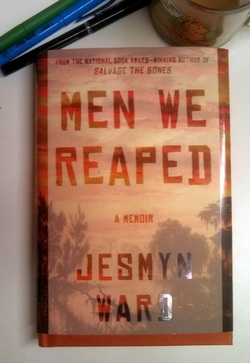 Dear Friend, Having just completed Jesmyn Ward’s Men We Reaped, I am again left thinking about Michael Donald. Not that it takes much to get me there. Michael, who I wrote about throughout Thirteen Loops, is someone I think about often. And not merely his violent death at the hands of a pair of Klansmen, but his life, too, or what I could cobble together about his life with the resources at my disposal. But that was always the problem with my book: no matter who I talked to, or what I read, I could never fully piece together the story of Michael’s life. I learned he was a good son, a fine brother, and a loyal friend, but that was about all I learned. The tragedy beyond the obvious tragedy of Michael Donald’s death is that I was unable to do justice to his life story. Reams of paper have been dedicated to his murder, but his life, at least for me, remains a mystery. Jesmyn Ward does a better job. In her book—which profiles the lives and deaths of five young African-American men she knew personally—Ward's focus remains on their lives. Her personal connections to the victims allowed her to get close in a way I couldn’t, thereby ensuring that the men she writes about are more than mere mysteries. Yet taken together, these men’s deaths speak to another mystery, one not even Ward can get to the bottom of: “…I wonder at our neighborhood’s silence,” Ward writes early on. “I wonder why silence is the sound of our subsumed rage, our accumulated grief.” She claims to have written the book to “give voice” to their stories, a rationalization I know well. I, too, have often told skeptical audiences that I—the white guy standing before them—wrote a book about racial violence in order to ensure that the stories of the past are not forgotten. It’s my way, I often prattle, of allowing the present to learn from the past. At the very least, it’s an explanation that helps me sleep at night. But before I get too self-righteous, I should probably state the obvious: writing about a young man’s murder probably helped my career. It didn’t make me rich or famous, but the book became a line on my CV. A young man was murdered in Mobile, and I added a line on my CV. My intention wasn’t to add a line—it was to write a book—and yet my intention and the outcome only partially synced. And who can know the full effect of that line? Perhaps it persuaded someone to grant me a job interview, and perhaps that job interview led to a job, which led to health insurance, and a pay check, and all because in 1981 a young man was murdered in Mobile. Or rather, because a young man was murdered in Mobile and then I wrote about his death. Not his life, mind you. His death. I tried to do the former, but I was not a skilled enough writer, and the few facts I had often slipped between my fingers. Ward never lets facts slip, mainly because the facts often come from her own life. When she writes of her brother’s death—a car crash involving an inebriated white man—she describes the story in full, one far larger than a momentary intersection of lives. Though her brother tried slamming on the brakes, Ward writes that there was “so much momentum, so many bodies and cars and histories and pressures moving all at once, that my brother could not stop his car.” I’ve read that line several times, and the word that always sticks out is “histories.” There were so many histories. So many stories tied to the story of her brother’s death. So many linkages, so many vantage points, so many ways to take hold of the thread of a single interaction and weave it into the fabric of a long line of racial injustices. No, I didn’t get drunk and behind the wheel, but I did take another risk. I was a grad student when I began the project, and while sitting on the steps of the University of Alabama’s Gorgas Library, I asked myself, Do you want to be the guy who tells the story or the guy who muffles it by not telling it? As you know better than anyone, Friend, I’m no victim and I’m certainly no hero. I’m just the guy who, every time he opens Ward’s book, is reminded of what he wanted to write. Write soon. Until then,
3 Comments
Rob Dixon
4/15/2014 03:17:09 am
BJ,
Reply
J. Pfeiffer
5/6/2014 10:57:44 pm
And I get to write after the guy who left a cool reply, but I promised myself to respond to each post I read, so here it is: Dude, every word helps the giant wound of that young man's tragic death to heal. Keep on saying it, because I believe our world is very good at forgetting tragedies and the people who caused them. We are less civilized because of it. Is it only a line on your CV? That depends on how separated you are from your CV in my opinion. It's the record of your professional life, which, if you are like almost everyone I know, is inextricably entwined with your personal life. Thanks for the thoughts.
Reply
Leave a Reply. |
AuthorB.J. Hollars is a writer and a teacher. Archives
June 2014
Categories |
 RSS Feed
RSS Feed